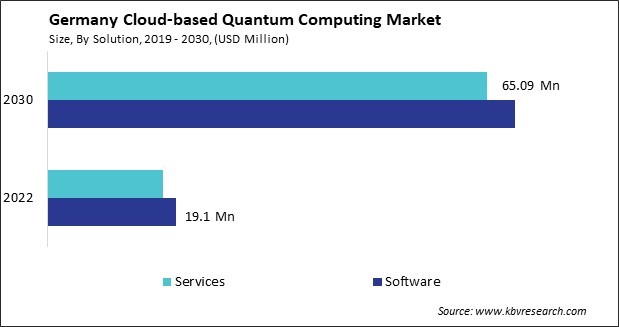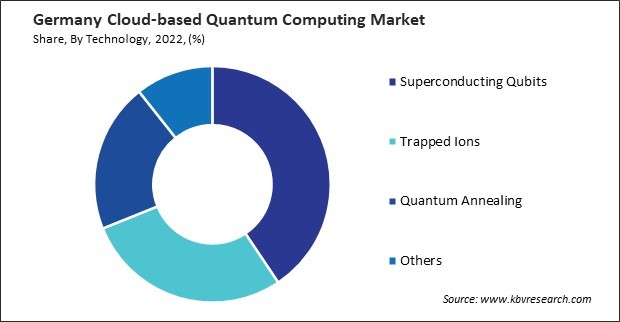Int'l : +1(646) 600-5072 | query@kbvresearch.com
Int'l : +1(646) 600-5072 | query@kbvresearch.com
Published Date : 02-Sep-2024 |
Pages: 78 |
Formats: PDF |
The Germany Cloud-based Quantum Computing Market size is expected to reach $134.21 Million by 2030, rising at a market growth of 18.0% CAGR during the forecast period.
The cloud-based quantum computing market in Germany has been experiencing significant growth and innovation in recent years. Quantum computing, solving complex problems exponentially faster than classical computers, has garnered immense interest from various industries, including finance, healthcare, logistics, and manufacturing. As a result, Germany, with its strong focus on technology and innovation, has become a hub for quantum computing research and development, attracting both domestic and international players.

One of the key drivers of the cloud-based quantum computing market in Germany is the increasing demand for advanced computing power to tackle real-world problems. Traditional computing methods are reaching their limits in solving complex optimization, simulation, and machine learning tasks. Quantum computing offers a revolutionary approach to these challenges, enabling faster and more efficient solutions. As a result, businesses and research institutions in Germany are increasingly turning to cloud-based quantum computing services to access this cutting-edge technology without the need for significant upfront investment in hardware and infrastructure.
Furthermore, the German government's support for research and innovation in quantum technologies has created a favorable environment for the growth of the cloud-based quantum computing market. Public-private partnerships, funding initiatives, and strategic investments aim to accelerate the development and commercialization of quantum technologies, including quantum computing. These initiatives foster stakeholder collaboration and help establish Germany as a global leader in quantum computing research and applications.
However, COVID-19 has significantly impacted the cloud-based quantum computing market in Germany. Organizations are increasingly exploring quantum algorithms for drug discovery, molecular modeling, and epidemiological simulations to combat the spread of infectious diseases. The pandemic has also disrupted supply chains, delayed research projects, and strained financial resources, posing challenges for developing and deploying quantum computing infrastructure. Travel restrictions and social distancing measures have hindered collaboration and knowledge sharing among researchers and industry stakeholders, impacting the pace of innovation in the quantum computing ecosystem.
The healthcare industry in Germany is witnessing a paradigm shift with the increasing adoption of cloud-based quantum computing solutions. Germany, renowned for its advanced healthcare infrastructure and commitment to innovation, is poised to usher in a new era of precision medicine and improved patient outcomes through the integration of quantum computing into healthcare systems.
One of the primary drivers of quantum computing adoption in the German healthcare sector is its ability to expedite drug discovery processes. According to Germany Trade & Invest, Germany stands as a prominent global hub for pharmaceutical production, boasting a substantial increase in production volume, reaching EUR 34.6 billion in 2021 with a remarkable 6.9 % year-on-year growth. The subsequent year, 2022, witnessed a notable surge in pharmaceutical industry sales within Germany, marking a 5.4 % increase and reaching EUR 56.5 billion. By leveraging quantum algorithms, pharmaceutical companies expedite the identification of potential drug candidates and optimize their chemical properties for enhanced efficacy and safety.
Moreover, cloud-based quantum computing offers scalability and accessibility, making advanced computational resources available to a broader range of healthcare organizations in Germany. Small and medium-sized enterprises (SMEs), research institutions, and even individual researchers harness the power of quantum computing without investing in expensive hardware infrastructure.
In addition to drug discovery, quantum computing holds immense potential for optimizing treatment plans and personalizing patient care. By leveraging quantum computing, healthcare providers in Germany enhance the effectiveness of treatments, minimize adverse effects, and improve overall patient satisfaction. Thus, integrating cloud-based quantum computing solutions into the German healthcare industry promises to revolutionize drug discovery, treatment optimization, and patient care, marking a significant leap toward precision medicine and improved outcomes.
Germany's cloud-based quantum computing market is experiencing a notable surge in demand for superconducting qubits, driven by advancements in quantum technology and the burgeoning need for high-performance computing solutions. One of the primary factors fueling the demand for superconducting qubits is their potential to revolutionize various industries, including pharmaceuticals, materials science, finance, and logistics. As a result, businesses across diverse sectors in Germany are increasingly exploring quantum computing to gain a competitive edge and drive innovation.
In Germany, renowned research institutions, universities, and technology companies are actively engaged in developing and commercializing quantum computing technologies. Collaborative efforts between academia and industry foster a rich quantum research and innovation ecosystem. Moreover, initiatives by the German government to invest in quantum technology research and infrastructure are further propelling the growth of the cloud-based quantum computing market.
Furthermore, advancements in quantum error correction techniques and quantum software development enhance the performance and reliability of superconducting qubits, making them increasingly attractive for practical applications. As a result, businesses in Germany are increasingly inclined to explore quantum computing solutions powered by superconducting qubits to address complex computational challenges and drive innovation across various domains. Therefore, the surge in demand for superconducting qubits in Germany's cloud-based quantum computing market is driven by technological advancements and government investments, fueling innovation across multiple sectors.

Renowned for its engineering prowess and innovation, Germany is emerging as a significant player in the cloud-based quantum computing market. Companies in Germany are actively investing in research, development, and commercialization of quantum computing solutions, leveraging cloud infrastructure to make quantum resources accessible to businesses and researchers across the country.
One notable player in the cloud-based quantum computing market is Airbus, a multinational aerospace corporation with a significant presence in Germany. Airbus is exploring the potential of quantum computing to solve complex optimization and simulation problems in aerospace engineering. By leveraging cloud-based quantum computing resources, Airbus aims to accelerate the development of next-generation aircraft designs, improve operational efficiency, and drive innovation in the aerospace industry.
SAP, a leading enterprise software company headquartered in Germany, is also active in the cloud-based quantum computing market. The company is exploring integrating quantum computing capabilities into its enterprise software solutions to enable faster and more efficient data processing, optimization, and decision-making. By leveraging cloud-based quantum resources, SAP aims to empower businesses in Germany and beyond with advanced computational capabilities to drive digital transformation.
Additionally, startups like HQS Quantum Simulations significantly contribute to the German cloud-based quantum computing market. HQS Quantum Simulations specializes in quantum chemistry simulations and offers cloud-based access to its quantum computing resources and software solutions. With a focus on accelerating materials discovery and drug development, HQS Quantum Simulations is driving innovation and collaboration in Germany's quantum computing ecosystem.
Germany's government is also actively supporting the development and adoption of quantum computing technology. Initiatives such as the Quantum Technology Flagship Program, launched by the European Union, aim to accelerate research and innovation in quantum technology and promote collaboration between industry, academia, and government agencies in Germany and across Europe.
Moreover, research institutions like the Fraunhofer Society and the Max Planck Society are conducting cutting-edge research in quantum computing and collaborating with industry partners to translate scientific advancements into practical applications. By leveraging cloud-based quantum computing resources, these research institutions are driving innovation and pushing the boundaries of quantum technology in Germany. Hence, Germany's cloud-based quantum computing market is characterized by a diverse ecosystem of companies, research institutions, and government initiatives driving innovation, collaboration, and adoption of quantum computing technology.
By Solution
By Technology
By Application
By Vertical